SBO Team
Oh, hi!
So, you wanna build a snowman know how to be a freelance writer?
Welcome to my world!
And let me start by saying that if I can do it, then you can, too!
It’s an awesome lifestyle, but it’s also hard, especially at the beginning. Sure, working from home, coffee shops, the park and wherever is great…
…but be prepared to put the hard work in. But once you’ve started to build momentum, then the freelance writing world is yours.
If you aren’t put off already, then I’d love it if you followed my step-by-step process on how to become a freelance writer below.
By the end, you should feel inspired and have a set of tools to get writing immediately, without any freelance writing experience.
Enjoy the journey 🙂
Table of Contents
What type of freelance writing is best for you?
Before I get into the steps to become a successful freelance writer, you should know and understand the different areas of freelance writing:
In my experience, from the easiest to the hardest, these are:
- Easiest: Blogging
- Easy: Copywriting
- Medium: SEO writing
- Hard: Business
- Hardest: Technical/Medical
- Insane: Fiction/Ghostwriting/Novels
My main focus is blogging; however, you could say that copywriting and SEO writing fall into the same bracket as blogging.
I advise you to master blogging and then look to expand elsewhere, especially as a beginner. Technical and medical writing is incredibly niche, and you tend to need a specific qualification or education in those fields.
For the most part, business writing comes with a prerequisite of a proven track record and the specific demands are much more complex.
For the rest of this article, my assumption is that you’ll start off as a blogger.
You might also like:
How to become a freelance writer: Getting started

Be proactive: start writing online NOW and learn how to become a freelance writer with these top tips:
- Understand your WHY
- Discover your passion—find a niche
- Start writing
- Enhance your freelance writing talent
- Set goals
- Join the freelance sites
- Build your portfolio
- Market yourself
- Next steps
WAIT! Don’t just run off and do those things. First, let me explain each in detail.
Step 1: Understand your WHY
I need to challenge you right off the bat.
Answer me this: Why do you want to become a freelance writer?
In my experience, with everything I’ve done, I’ve only been successful because from the very beginning I’ve understood why I wanted to do something.
So, right now, grab a piece of paper and a pen, and write down a list of all the reasons why you want to be a writer.
Don’t cheat! I see you typing into your computer. Go old school and use your hand; it’ll help engage your brain better.
Here are some pointers that might jumpstart your thinking:
- Lifestyle
- Extra income
- Being your own boss
- Energize your creative writing juices
- Because someone told you so—that’s NOT a reason!
- Spend more time with the family
- To appeal to a natural ability
There are heaps more, but those should get you started.
For me, it was a lifestyle choice.
I was an accountant—serious yawn factor—for over 15 years, and while it paid well and I was confident in my abilities, the lifestyle was horrendous, and I never felt a sense of achievement.
I’d also started a family with my wife and was traveling during the first few weeks of both my boys being born. That SUCKED!
And that’s what spurred me on to become a freelance writer—and I had no experience, either.
So, throughout this journey, never give up.
Step 2: Discover your passion and find a niche
This is probably the toughest and the most fun part.
For some, you may already know where your passions lie. If you’re like me, you’ve hit a hurdle, so this is where I present to you a get-out clause.
You don’t have to have your own niche to become a successful freelance writer. I actually found the niche that would start to provide me with an income by registering with freelance writing websites and bidding on work.
But hold up, I’ll guide you through that shortly.
I strongly advise you to stick with this step for now. Do me a favor and create two lists:
- Grab a pen and paper again
- Draw a line down the middle of the page
- On the left, write a list of the things you’re good at
- On the right, write a list of the things you’re passionate about
When you’re done, in an ideal world, there’ll be some alignment, and if you can find something that you’re both talented at and passionate about, then that should be your focus.
But don’t panic if you’re still stuck. The good news is that you can both learn how to blog/write AND your passions develop in time.
If you have to pick on one thing, then I’d focus on what you’re passionate about. By honing your lasers onto something that you love, you’re much more likely to be successful in the long run.
Trust me, this is coming from a guy that was freelance writing about the “best waffle makers” at 2 am before throwing the towel in with a particular client.
Still stuck? Here are some pointer niches:
- Gaming
- DIY
- Personal development
- Lifestyle
- Comedy
- News
- Fitness/health/nutrition
- Technical
They might sound obvious, but there are many, MANY micro-niches within those, but the idea is to get you thinking for yourself and finding your passion.
This will then link in very well with your WHY.
Freelance writing success = writing on a topic you’re passionate about + working toward something you’re passionate about.
Calculus ain’t got nothing on me!
Friendly reminder: don’t give up!

Our #1 Choice For Hosting Blogs
62% Off Exclusive Offer Applied at Checkout
Regularly
$6.95/mo
Starting From
$2.64/mo*
- Free 1 Year Domain Registration on Select Plans
- FREE SSL Certificate
- Drag-and-drop Website Builder
- E-commerce Ready
- 1-Click WordPress Installation

Step 3: Start writing
Who do you think is going to become a freelance writer first out of these two awesome people:
- Maggie: Spends weeks reading about how to become a freelance writer
- Glen: Reads up on the basics in a couple of days and gets to work
If you went with Glen, you don’t get a prize but are correct.
You Maggie fans are bang out of luck and need to change your mindset already.
I was a Maggie, and I still am to a point. I’m one of those frustrating types that only feels ready to do something when they’re armed with all the necessary information.
DON’T BE LIKE ME! Just start writing.
You don’t even need to go off and buy a domain, sort out hosting, get WordPress set up and muddle through templates and plugins.
Instead, do this:
- Create a free Google Account
- Go into your Google Drive
- Create a new Google Doc
- Start writing
The writing skills, format and layout come later. For now, just start writing about what you’re passionate about.
Friendly reminder: don’t give up!
Step 4: Enhance your writing talent
By now, you should’ve started writing. If you haven’t, please go back over steps 1–3 and start again.
If you’ve managed to get some type of content down, then well done!! I’m proud of you 🙂
We’re now going to focus on that wall of text you’ve just written.
I asked you to use Google Docs because I find it much more user-friendly than Microsoft Word. Also, many of your future clients are likely to use G’Docs over Word for its excellent ability to share the document with specific people.
I’m future-proofing you.
What we’re now going to do is make sure your content is three things:
- Readable
- Fun
- Engaging
And at all times in your writing, ensure that it adds value to your audience—if you can say something in fewer words, you generally should.
How to become a freelance writer and create readable content
Your aim is to engage the writer from the very beginning. This will immediately stand you out from the competition and accelerate your success at landing freelance writing work.
To do this, you should focus on these areas first:
- Title
- Introduction
- Formatting
- Images
- Links
- Conclusion
1. Create the perfect title
How many times have you read a piece of content and been put off by the title? It could’ve been because it was either too long, too wordy or didn’t make sense, or all of these.
Use these pointers to create the perfect title:
- Create intrigue
- Keep it short
- Use simple words
- Make it relevant to your niche
This then extends well into the introduction.
2. Hook your reader with the introduction
The reader’s engaged by your title, so now use the introduction to make them continue into the body of your post.
Something that works well for me is humor. I like to joke around, so that style of writing fits my personality really well—even if my wife and kids never laugh at my jokes. See? That was a joke!
If you’ve read this far, then my intro to this very article has intrigued you, so I was successful.
But note that there are some key things in my introduction:
- Humor
- Relevance
- Short
- Friendly
- Indicates what you’re going to learn/gain
- Encourages you to read on
Those points should give you a good starter. Avoid saying things like, “In this article, you’ll learn…”
To me, that’s naff. Use engaging and compelling language to get the reader to carry on.
3. How to format your article as a freelance writer
Seeing a wall of text without any spacing or breaks will immediately disengage your reader.
See how I’m using relatively short paragraphs and even some one-liners?
I also give you breaks from reading…
…like this.
You don’t want every paragraph to be one line, though. Doing that will just create a massive article that makes the reader think they’re going to be there for hours. Try and keep your paragraphs to a maximum of four lines.
You also want a line between each paragraph—ignore what you were taught in school about starting a new paragraph on the next line.
Breaking up text with ordered and unordered lists is also an excellent idea. They enhance readability and Google is thought to love them.
4. Using imagery to boost your freelance writing success
To add to the readability of your articles, break it up with high-quality imagery. You can use your own images for this, but you can also use CC0 images, which are copyright-free.
Sites you can use this for are:
- Pixabay
- Unsplash
- Pexels
Look! Here’s a sexy one of my hands writing this article:

Gotcha! They aren’t my hands, but the image is:
- Relevant to this article
- Of a high quality
5. Rely on authorities to make yourself an authority
If you make one of the following, then you should link to an authoritative source to back you up:
- Quote
- Statement
- Claim
- Fact
Let’s say you’ve been asked to write a guest post on one of the most competitive search terms ever: “How to lose weight” and you’ve included this claim…
“Obesity is thought to be the 5th highest cause of deaths on the planet.”
Now, you can’t throw around statements like that without referencing your source, and you also shouldn’t quote your best friend who saw Karen from Facebook sharing a tweet from her neighbor’s cat, who claims to be a dietician.
Instead, head to one of these types of sites that uses science and evidence-based material to make such a claim:
- .gov
- .edu
- .ac
In my example, I used PubMed, which is a notable authority on medicine and health. So, in my example, I would credit that site as such:
“Obesity is thought to be the 5th highest cause of deaths on the planet.”
Referencing is a completely different kettle of fish, but always consider backing up your claims to land you more credibility and success as a freelance writer.
6. Conclusion
Use the final words of your article to succinctly summarize your written piece.
It should pull out the key points you’ve made and encourage the reader to take action. This can be in the form of encouraging them to engage with you on social media, sign up for a free course, or to read another article.
No matter what you do, don’t just make it something you have to do. It’ll stand out like a sore thumb.
Remember, always keep the reader engaged.
Becoming a freelance writer: what tools to use
I always advise people to write naturally at first. This means your content doesn’t come across as if it’s been written by a robot.
Also, software isn’t all that good at picking up slang and quirks. A lot of the stuff (“stuff” would be edited out by software) that I write is from me as the persona, so it’s important that I use my personality rather than a predetermined style.
For me, perfect English comes across as robotic, boring and uninspiring, so I suggest you only use these tools as a backup to your work:
- Grammarly
- Hemingway
Grammarly is excellent for picking up the obvious problems, such as spacing, incorrect capitalization of proper nouns, and general “correct” use of English.
Hemingway is awesome for advising on readability, cutting out unnecessary adverbs and overuse of passive voice.
Since they focus on different aspects of English, I advise that you use both!
Friendly reminder: don’t give up!
Step 5: Set goals
Quite often, I talk to my peers about starting off with goal-creation at the very beginning of any journey. Goals help you veer down the right track and to keep journeying in the right direction.
This is one of my favorite quotes on goals:
One way to keep momentum going is to have constantly greater goals
Michael Korda (former editor-in-chief at Simon & Schuster) Tweet
However, when I started off any project with goals, I felt like I’d already achieved something, to the point where that goal-setting process actually slowed me down.
And so, now that you have some content under your belt—go back to step 1 if you haven’t written anything—it’s goal-setting time.
Your goals can be as small or as big as you like, but I encourage you to dream big, for:
We only work to a level that our goals allow us
Chris McDonald (illiterate genius) Tweet
This goal-setting process should link back to your “why.” For example, if your reason to become a freelance writer was to spend more time with your family, perhaps you need to quit your regular job first.
With this in mind, think of these things. I like to work backward:
- By when do I want to quit my job?
- What monthly income do I need to quit my job?
- How much freelance writing do I need to do each month to quit?
- How many articles is that per month?
- How many articles is that per week?
- How many articles is that per day?
And there you have your answer. You may not know the monetary amounts yet since you’re still a newbie, but those are the kinds of things you need to be thinking about.
Also, try and spread your goals across different areas of your life:
- Money
- Time
- Lifestyle
It’s ok to have a sole monetary goal, but I find that money stems from achieving other goals, like wanting more time to travel. A natural by-product of wanting to travel is needing money.
Besides, if all we do is focus on money, then money becomes the problem. And we want more, and more, and more, and we get money-hungry and greedy, and we forget about the things that really matter in life.
OK, #lifelessonover.
Top tip for goal creation: create a vision board
Once you know what your goals are, grab a whiteboard or corkboard and stick some images that are relevant to your goals.
Want to go on a safari in Africa? Print out an image of African wildlife.
Want an Aston Martin Vantage? Hell yea! Stick an image of that up.
No matter your goals and visions, make sure they’re SMART:
- Specific
- Measurable
- Achievable
- Relevant
- Time-based
You should also be reviewing your goals consistently, so I advise you to set the following goals:
- 5-yearly.
- 3-yearly.
- Yearly.
- 6-monthly.
- 3-monthly.
- Monthly.
- Weekly.
- Daily.
And remember, link them back to your WHY.
Friendly reminder: don’t give up!
Step 6: Join the freelance sites
When I first started freelance writing, I was a member of an internet marketing hub called WarriorForum. It was—and still is—awash with many an affiliate marketing guru.
It didn’t take me long to pick up some clients on there when it was clearly obvious that they struggled to create engaging content, and they also couldn’t spell properly.
A few DM’s and a few days later, I had clients! Amazing 🙂
However, the world has evolved since then, and I have these two sites to thank for my current freelance writing career:
- UpWork
- Freelancer
The one I suggest you focus on first is UpWork. Although Freelancer was my first official writing gig, it’s awash with scammers and low-grade writing jobs.
UpWork is a much more professional freelancer site, with a robust and rewarding rating system to launch your freelance writing career.
Other sites to look into are:
- Fiverr
- Guru
- PeoplePerHour
- TextBroker
- ContentMart
- ConstantContent
Getting started with UpWork as a beginner
Becoming a freelance writer on UpWork is as simple as:
- Register and set up your profile
- Understand how the platform works
- Take all the related certifications
- Bid for your first job
- Expect rejection
- Be consistent
- Deliver exceptional work
- Market yourself
1. Setting up your UpWork profile
Once registered, fill in your profile logically and truthfully. Remember, you want to come across as a professional.
Try and use a professional headshot, too. Clients are more likely to trust a freelancer that has no problem showing their face—there are a lot of scammers out there.
You also need to create a blurb about yourself. This is the first thing your client will see when you apply for their project, so make this relevant and engaging. There’s also a cut-off, which you can see from my profile picture below:
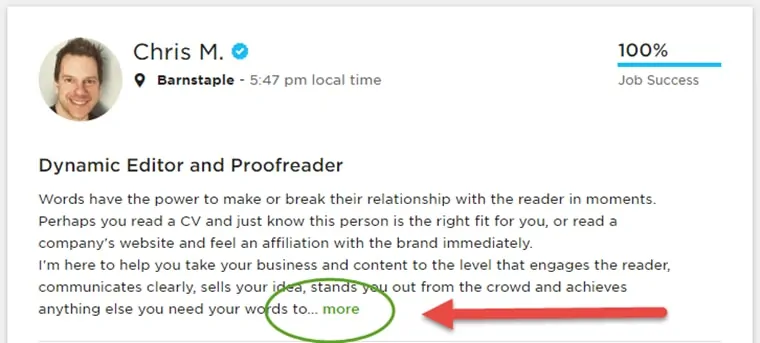
2. Understand how the platform works
The process works like this:
- The client will post their project
- You bid for the project using a token system called “Connects”
- The client will then review your profile, your sales letter, your bid amount and then decide to either interview you, hire you, reject you or ignore you
- If you’re successful, the client will award you the contract. You might not hear anything if you were unsuccessful
- You then submit the work
- If both parties are happy, the contract can be closed
- Payment is then processed
- Feedback is left
One of the toughest things I found with UpWork was the rejection. I went my first month without winning any bids, and part of that was because I was new and wasn’t entirely sure what I was doing.
If you aren’t successful with a bid, you’ll either be ignored or rejected.
Yes, ignored or rejected. And you won’t even know this unless they send you a message to say so. Sometimes, that silence is hard to take…
…but when you win that first contract, it’s like you’ve just won the lottery!! I still remember that feeling today. It was awesome, and you’ll feel it, too—I know it!
You’re reading this very post due to me winning a successful project on UpWork. It was for a different project, but it was posted by my partner in crime here at StartBloggingOnline—hey, that rhymes—Chris Naish, and here’s his feedback for me:
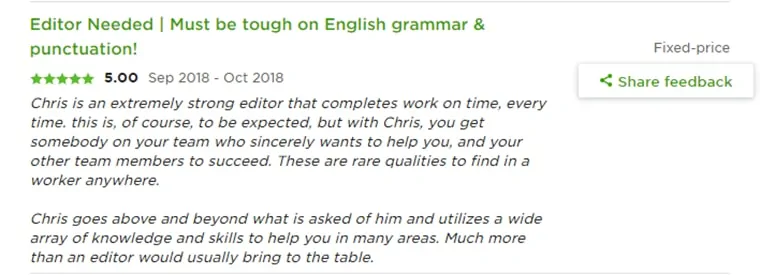
Now, Chris is a super nice guy anyway, but that feedback just shows the importance of doing a good job, which I’ll get onto shortly, and the feedback system.
From my earlier screenshot, you’ll see my 100% job success score. This also pulls from the feedback system, which takes a combined score out of 5 for different areas and populates that score percentage.
3. Bid for your first job
Bidding for your first job on UpWork is both daunting and exciting, but I suggest you embrace it with open arms!
To browse the freelance writing jobs on UpWork:
- Click on “FIND WORK” at the top of the page
- Then click on the pencil icon on the left, as per the below image
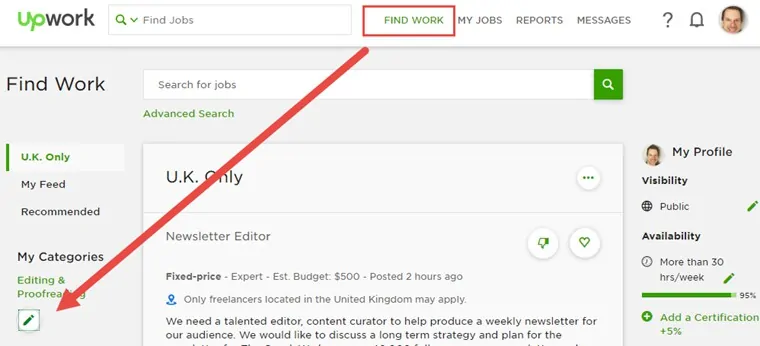
- Then scroll down to the “Writing” section and select all the relevant areas you want to browse and then click “Save”:
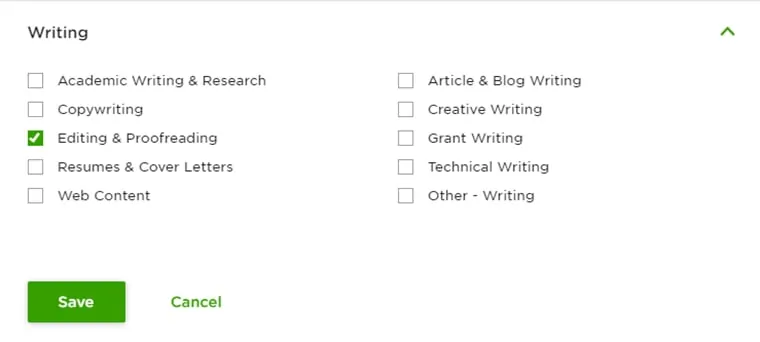
- Your home page feed will then be updated. On the left, you can change the view to your region only or the entire feed.
When browsing for jobs, I advise you to only look at ones that have the blue-tick “payment verified” indicator. Scammers will try and get free work out of you, and they do this by not having a verified payment method on their account.
Bidding for projects through clients without a star-rating is fine because UpWork automatically places funds in Escrow from their verified payment method.
Of course, be aware of potential clients that have a very low star rating.
Here’s a good example of a worthwhile project to bid on:
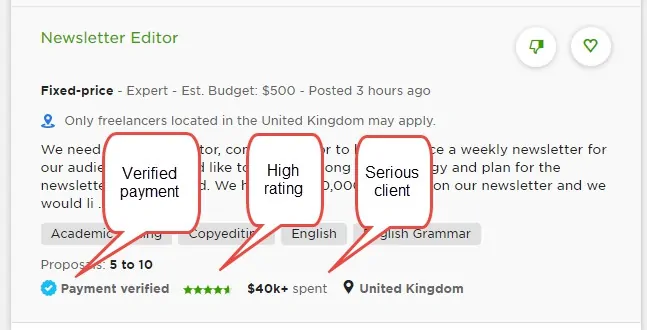
If you like the look of the project, click on it, and you’ll see the project’s entire information.
Before you go bidding blindly, think about a couple of key things:
- Do you meet all their requirements? If not, they might ignore you
- Are they already interviewing and have they sent invites? If so, you might have missed the boat
- Are there lots of proposals? If so, it’s a highly competitive project
Once you’re happy to continue, click on “Submit a Proposal.”
This is where you get to check the terms once more and then sell yourself. Fill in the “Terms” section with your bid proposal.
Top tip: Consider underbidding. I did this to start off with and it meant I landed successful work and ongoing clients. Once you build a reputation, you can then leverage your rate.
Sell yourself with the cover letter and make sure every single aspect they talk about in their project is covered, whether you can do it or not.
Put yourself in their shoes; how would you want the best candidate to come across?
Here are some tips:
- Copy their tone but don’t force it
- Be yourself
- Don’t waffle
- Be engaging
- Welcome an offer to chat further at the end
- PROOFREAD YOUR APPLICATION!
Once you’re ready to submit your proposal, hit the button! Note that your Connects amount will drop now, usually by four, and you have 60 free connects each month. Currently, it costs $0.15 to replenish each connect, which I find a bit cheeky on UpWork’s part.
4. Expect rejection and be consistent
Congratulations! That was a big step you just took and you’ve submitted your first proposal.
You now need to rinse and repeat but don’t expect to hear back from that client. Think of bidding for jobs as a numbers game—the more you bid for, the more chance you have of winning successful projects.
Also, make sure you use up all your free Connects! Hell, I even ventured off and bid for data analyst and number-crunching jobs when there weren’t any freelance writing-related ones.
If you do receive a message from a project owner, make sure you reply as soon as possible. These clients want their work done as soon as possible, but they also want freelancer writers who are punctual and reliable.
5. Deliver exceptional work
When you successfully win a project, make sure you go beyond the call of duty to deliver. This is your first real chance at becoming a successful freelance writer, so do your best!
Ask all the questions you need to upfront and make sure you know exactly what is expected of you. Don’t be afraid to ask for an extension, either, but try your best to avoid this.
If you need more motivation at this point, focus on your why, your goals and your dream/vision board.
6. Provide feedback
Once the work is delivered and the milestone payment has been released, be sure to provide feedback to the client.
This is where morality kicks in a bit. You aren’t punished for providing bad feedback to the client, in that they can’t then provide you with a poor feedback rating.
I’ve had some really poor clients on UpWork—ones that went AWOL, gave me no guidance and were super slow to reply. I felt I had a duty to provide relevant feedback so any future clients wouldn’t be negatively impacted.
Clients will be grateful, of course, if you provide them with excellent feedback, and you’re more likely to receive more work.
Just be honest.
7. Follow up and market yourself
Something that really worked for me was to drop old clients a message after the project was complete. I even asked for some pointers where I could improve, and that meant the clients kept coming back to me.
Even the small things matter, like if you’re going away on holiday. Just send them a message to let them know the timescale but that you’ll be back to take on any further work they need.
Also, if your work has died off a bit, think about giving old clients a slight discount if they send you anything in the next 7, 14 or 30 days—whatever works for you!
Friendly reminder: don’t give up!
Step 7: Build your portfolio
UpWork is an excellent place to build your portfolio, so use the templates on there to showcase your client history and feedback.
But also consider setting up your own blog so you can house your writing in your own niche.
You can then point future clients to your own site so they can take a look at your style with ease. I was stumped here because all of my first pieces of work were ghostwritten so I had nothing to show.
Do better than me and create your own work on your own site:
- Buy a domain
- Grab some hosting
- Set up WordPress
- Grab a visually engaging theme
- Install basic WordPress plugins
- Write about your passions—see step 2
Once you’re more confident in your freelance writing capabilities, you can look to optimize your content for SEO, which is something I highly recommend doing.
Friendly reminder: don’t give up!
Step 8: Market yourself and network
Uhhhh!
This is the bit I neither enjoy nor am I good at.
UpWork effectively did the marketing for me due to its feedback and job score system, but that only happened because I dedicated myself to nailing the work I sent in.
What you should also look to do is outreach and use social media.
Marketing yourself through social media
In particular, consider writing articles on LinkedIn, which is an excellent way to pick up freelance writing work. All the major recruitment agencies are on there, and Indeed.com is always showing up in my feed with writing, editing and proofreading gigs.
But don’t leave it in their hands, get set up with all the social media platforms, especially Twitter and Instagram.
Every time you write something on your own blog, or even something the client is happy to credit you for—ask them, don’t assume—share it. If you want to fully schedule and automate your social media posts, then consider a platform like Hootsuite!
Set yourself a schedule, too. Spend a dedicated amount of time per day to engage with relevant social media content.
Use guest posting as a freelance writer
Guest posting can be a bit hit or miss, but if you manage to network well, you could have work coming back to you for years to come!
The best place to start is by going to a blog that you like. Consider the ethos of the owner and the nature of the content. If that site has a guest posting dedicated segment, all the better.
If not, reach out to them—comment on their blog posts, email them directly or contact them on their social media.
If you don’t ask, you don’t get.
The more you network, the greater the chance you have of nailing that one big client that can launch your freelance writing for good.
Friendly reminder: don’t give up!
Step 9: Next steps on becoming a freelance writer
Well done on making it this far!
If you’ve done everything I’ve laid out, then you’re already on the road to become a successful freelance writer.
The best thing to do now is to go back over everything and see if you can do anything better, and keep applying for those jobs on UpWork and any other freelance platform you’ve found.
The further you spread yourself, the more you can build that portfolio and scale up your business.

Our #1 Choice For Hosting Blogs
62% Off Exclusive Offer Applied at Checkout
Regularly
$6.95/mo
Starting From
$2.64/mo*
- Free 1 Year Domain Registration on Select Plans
- FREE SSL Certificate
- Drag-and-drop Website Builder
- E-commerce Ready
- 1-Click WordPress Installation

How much to charge as a beginner freelance writer?
There’s no simple answer to this since it varies heavily on the niche and client’s budget.
But to start, I took on anything that would get my foot in the door. Now I wouldn’t say you should definitely do the same, but it worked for me since I already had a full-time job bringing in enough money.
As you gain more clients and get busier, you can look to command higher and higher rates, but you should definitely consider what you feel is worth your time.
If you’re unhappy working for less than $25 an hour, then you should find work as a beginner freelance writer.
Some of the top-rated writers on UpWork won’t do anything for less than $100 an hour, so that should show you the magnitude of the possibilities.
Chris McDonald Tweet
How to become a freelance writer with no experience: key takeaways
By making it this far through my post, you’ve already succeeded where many haven’t.
That shows me you have passion about becoming a freelance writer, so I encourage you to now go off and take even more action.
Remember that the key to freelance writing is to get started and get yourself out there. When you’re writing, though, never compromise on quality for speed. That extends to bidding on work on freelance sites—if you can’t deliver your very best, don’t bid on the project.
I wish you all the success with your freelance writing career.
Focus on your why, set those goals and get writing.
Most of all, be yourself and enjoy the journey.
FAQs
How hard is it to be a freelance writer?
Do writers work for free?
Is writing fun?
Is Freelance writing a good career?
I most certainly believe it is a good career, but only if you always look to improve your skills. You also need to have a penchant for writing—you won’t get much success if it’s clear that you aren’t that interested. If you apply yourself, though, you can make some incredible connections and earn an excellent wage.
How do freelance writers get paid?
Freelancer writers usually get paid on a project-by-project basis if going through a freelancer site, such as UpWork. The rate could be hourly, a one-off fixed fee or on a per word basis. If you’re taken on long-term as a freelance writer, expect to invoice monthly on a price per word.
Related articles:


